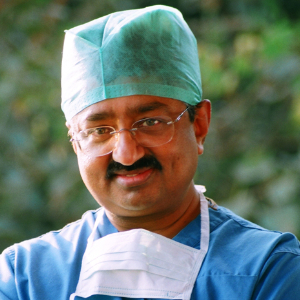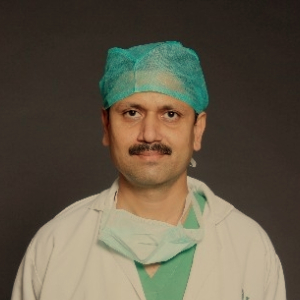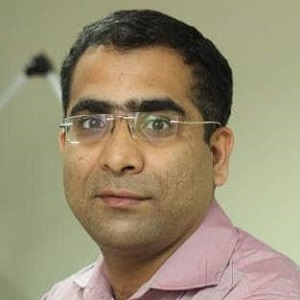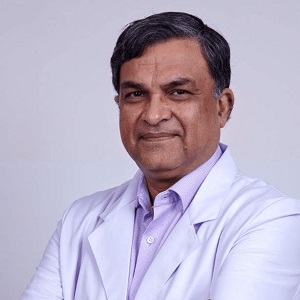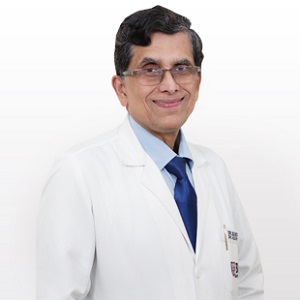Best Doctors in India for Alcoholic Hepatitis Treatment
- Chief Cardiothoracic & Vascular Surgeon, Bangalore.
- Over 38 years’ experience
- Fortis Hospital Banerghatta Bengaluru
Profile Highlights:
- Dr. Vivek Jawali is a renowned Cardiothoracic and Vascular Surgeon in India and has performed more than 18,000 cardiothoracic and cardiovascular surgeries.
- He has several firsts to his credit that including the first beating heart bypass surgery in 1992 and the first Minimally Invasive Heart Bypass surgery in 1994 in India.
- He performed the first Awake Cardiac Surgery in 1999 which is done without general anesthesia or ventilator but under continuous high thoracic epidural. He also performed the first awake open heart surgery in the world without general anesthesia or ventilator on a 74-year-old patient for triple bypass with aortic valve replacement.
- Medical Oncologist: Artemis Hospital
- Over 10 Years' Experience
- Artemis Hospital, Gurgaon
Profile Highlights:
- Dr. Priya Tiwari is a distinguished Medical Oncologist based at Artemis Hospitals in Gurugram, renowned for her expertise in comprehensive cancer care.
- She has 10 years of experience.
- Her medical education includes an MD in Medicine and a DM in Medical Oncology from AIIMS, alongside an MBBS degree from IMS, BHU, where she was a gold medalist.
- IVF Specialist & Gynaecologist, New Delhi, India
- Over 24 years’ experience
- Fortis La Femme New Delhi
Profile Highlights:
- Dr. Sunita Arora is a distinguished Infertility Specialist based in New Delhi, renowned for her expertise in endoscopic surgeries and infertility treatments.
- With a deep commitment to providing personalized care, Dr. Arora specializes in advanced infertility treatments including In Vitro Fertilization (IVF) and Intra Uterine Insemination (IUI).
- Dr. Arora holds an MBBS and MD and is widely recognized for her dedication to advancing the field of reproductive medicine.
- Top Surgical Oncologist | Apollo Hospital, New Delhi, India
- 20+ Years Experience
- Indraprastha Apollo Hospital, New Delhi
Profile Highlights:
- Dr. S M Shuaib Zaidi is a Senior Consultant of Surgical Oncology at Apollo Cancer Institute of Indraprastha Apollo Hospital.
- His expertise lies in the surgical treatment of cancer of the lungs, esophagus, breast, GI tract, and mediastinal regions.
- Dr. Shuaib Zaidi has close to 2 decades of experience in the field of Surgical Oncology and his expertise lies in Thoracic Oncology surgery.
- Dr. Shuaib is known to have developed an innovative technique known as Radical Neck dissection for head and neck cancer surgery that helps in preserving the marginal mandibular nerve in order to ease the cosmetic outcome of the procedure.
- Dr. Zaidi also has experience in Robotic Surgery and received training in the procedure from IRCAD in Strass Bourg, France.
- Ophthalmologist, Eye Surgeon, Gurugram, India
- Over 20 years’ experience
- Artemis Hospital, Gurgaon
Profile Highlights:
- Dr. Naginder Vashisht underwent observership in Vitreo-retina and ocular trauma under the guidance of Dr. Robert Morris, MD at Retina Specialist of Alabama, USA. Furthermore, he obtained his fellowships from the International Council of Ophthalmology (London) and the Royal College of Physicians and Surgeons of Glasgow.
- Dr. Vashisht’s area of interest in Ophthalmology includes Phacoemulsification, Uvea, Vitreo-retina, and Ocular trauma, and he also has numerous complex and advanced retinal surgeries to his credit. His specialization is in the management of diabetic eye conditions, eye trauma, and retinopathy of prematurity.
- Pediatric Urologist, Chennai, India
- Over 25 years’ experience
- Apollo Children Hospital Chennai
Profile Highlights:
- Dr. Sripathi is a renowned surgeon with 25 years of experience in the field of Pediatric Urology.
- Dr. V Sripathi qualified for the award of the “Fellowship of the Royal Australasian College of Surgeons” (FRACS) after working in Perth and Melbourne, Australia.
- He completed his Pediatric Urology training with a brief stint at the King Faisal Specialist Hospital & Research Center in Riyadh, specializing in advanced Reconstructive Urology.
- Top Vascular Surgeon | Max Hospital, Saket, New Delhi, India
- 35+ Years Experience
- Max Super Specialty Hospital, Saket, New Delhi
Profile Highlights:
- Dr. (Col) Kumud Rai belongs to the top class of Vascular Surgeons in India. He has more than 25 years of experience in being a Vascular Surgeon.
- Dr. Kumud Rai has been a Tutor for the Royal College of Surgeons in the UK and an examiner in several MCHs.
- Dr. Rai has spent a major part of his life serving the Indian Army in both educational and professional sectors.
- Dental Surgeon, Periodontist & Implantologist | Apollo Hospital, New Delhi, India
- 29+ Years Experience
- Indraprastha Apollo Hospital, New Delhi
Profile Highlights:
- Dr. Adosh Lall is a highly experienced dentist with over 29 years of practice, currently affiliated with Apollo Hospitals Indraprastha in New Delhi.
- He is recognized for his expertise in comprehensive dental care, holding prestigious qualifications including BDS, MDS, MIAP (USA), FPFA (USA), MAOI, FICOI (USA), and being a Diplomate of the World Congress for Oral Implantology.
- His extensive experience covers a broad spectrum of dental conditions, such as tooth decay, bleeding gums, sensitive teeth, and jaw aches.
- General Surgeon, Gurugram, India
- Over 40 years’ experience
- Fortis Memorial Research Institute
Profile Highlights:
- Dr. Ajay Kumar Kriplani has the credit of being the first in India to perform laparoscopic adrenalectomy and laparoscopic splenectomy and performing the first laparoscopic Whipple’s pancreaticoduodenectomy in North India and he is one of the best laparoscopic surgeons in Delhi and Gurugram.
- Dr. Kriplani has been invited as a faculty for 395 live demonstrations, Guest lectures, orations, and keynote addresses at conferences in various Indian cities and outside India e.g. Rome, Hongkong, Kualalumpur, Singapore, Tashkent, Dubai, Kathmandu, Dhaka, etc.
- Top Nephrologist | BLK Hospital, New Delhi, India
- 38+ Years Experience
- BLK Super Specialty Hospital, New Delhi
Profile Highlights:
- Currently serving as the Principal Director and Head of the Nephrology Department at BLK-Max Super Speciality Hospital in Delhi, Dr. Prakash has built a reputation for his expertise in managing acute and complex nephrological disorders.
- With over 38 years of experience in nephrology and renal transplantation, Dr. Sunil Prakash is a leading expert in the field.
- Dr. Prakash’s academic credentials are exemplary, holding an M.B.B.S., M.D. (Indian Medicine), D.M. (Nephrology), and fellowships from prestigious institutions in the USA, including FISPD and F.I.S.N.
Best Hospitals in India for Alcoholic Hepatitis Treatment
ALCOHOLIC HEPATITIS
Alcoholic hepatitis is a liver infection, which is mainly caused by frequent, heavy use of alcohol. Fat can build up in the liver cells, which might lead to inflammation as well as scarring of the liver.
Alcoholic hepatitis might be mild or severe. A patient might even need a liver transplant if proper treatment is not provided, or if they don’t stop consumption of alcohol.
It is also notable that all heavy drinkers don’t develop this condition, and sometimes this condition even develops in people who drink moderately. However, if you are diagnosed with this condition, it is important for you to quit drinking alcohol. People who continue drinking alcohol might face a huge risk of serious liver damage as well as death.
Symptoms
Depending on the amount of damage to the liver, the symptoms can vary. If you are having a mild form of the disease, you might not even experience any symptoms at all. However, as the damage continues to grow, you might experience the following:
- Changes in appetite
- Dry mouth
- Weight loss
- Pain or swelling in the abdomen
- Jaundice, or yellowing of the skin or eyes
- Fever
- Nausea and vomiting
- Easy bleeding or bruising
- Changes in your mental state, including confusion
- Fatigue
The symptoms of this condition are similar to those caused by a few other health conditions. Therefore, if you develop any of these symptoms, it is best to get a proper diagnosis as well as begin treatment.
Causes & risk factors
Alcoholic hepatitis generally develops when the alcohol you drink causes damage to your liver. However, it is not clear why alcohol does this damages only to some heavy drinkers.
Few factors that are known to play a role in this condition include:
- The body’s process that breaks down alcohol produces some toxic chemicals
- These chemicals can trigger inflammation that can destroy the liver cells
- Thus, over time, scars replace healthy liver tissue, thus interfering with the function of the liver
- This irreversible scarring, which is also termed cirrhosis, is the final stage of alcoholic liver disease
If you have hepatitis C and continue to drink, even moderately, you are more likely to develop cirrhosis.
Some heavy drinkers are also malnourished because they don’t eat a proper balanced diet. Alcohol and its byproducts also prevent the body from absorbing nutrition properly. Lack of nutrition can contribute to liver cell damage.
Some other risk factors that can lead to this condition include:
- Your sex- Women are usually at a higher risk of developing alcoholic hepatitis since the way alcohol is processed in women is different.
- Binge drinking- Having over five drinks within two hours for men and four or more for women can increase the risk of alcoholic hepatitis.
- Obesity- Heavy drinkers who are overweight are also more likely to develop alcoholic hepatitis and to progress from that condition to cirrhosis.
- Race and ethnicity- Hispanic and Negroid people might be at higher risk of alcoholic hepatitis.
- Genetic factors- According to studies, there may be a genetic component in alcohol-induced liver disease. However, it is difficult to separate genetic and environmental factors.
Diagnosis
If you are showing symptoms of alcoholic hepatitis, your doctor will first inquire about your medical history and alcohol consumption. Next, he/she will perform a physical exam to see if you have an enlarged liver or spleen. They might also need a few more tests to confirm your diagnosis, such as:
- Complete blood count (CBC)
- Liver function test
- Ultrasound of the liver
- Abdominal CT scan
- Blood clotting tests
In some cases, a liver biopsy might also be needed to confirm the diagnosis of alcoholic hepatitis. A liver biopsy requires your doctor to remove a tissue sample from your liver, which is then tested in the lab. This method helps to show the severity and type of liver disease.
Treatment
Stopping alcohol consumption is the most important treatment for alcoholic hepatitis. There is no cure for this condition, but treatment can help in reducing or eliminating symptoms, or stopping its progression.
It is also important to note that scarring of the liver is permanent, but treatment can aim to restore as much function as possible.
Dietary changes
Medication
Liver transplant
The best hope of recovery is to be aware of the signs and symptoms as well as to reduce, manage, or if possible, completely stop consumption of alcohol.
Complications
Alcoholic hepatitis might lead to severe other complications such as:
- Enlarged veins (varices)- In this condition, blood that is unable to flow freely through the portal vein, can back up into other blood vessels in your esophagus or stomach.
- Hepatic encephalopathy- This condition can be caused by the buildup of toxins if your damaged liver is unable to remove all the toxins from your body. It involves confusion, drowsiness, and slurred speech.
- Ascites- Ascites is a condition in which the fluid that accumulates in the abdomen may get infected and thus, require treatment with antibiotics. Although this condition is not life-threatening, it can be a sign of advanced alcoholic hepatitis, or cirrhosis.
- Kidney failure- A damaged liver affects blood flow to the kidneys, thus resulting in kidney failure.
- Cirrhosis- The scarring of the liver might lead to liver failure.
Prevention
Alcoholic hepatitis might be prevented if you take the following steps:
- Drink alcohol in moderation, if at all- For healthy adults, moderate drinking means no more than one drink a day for women of all ages and men older than 65, and not over two drinks a day for men aged 65 and younger. However, if you prevent all alcohol, it is a certain way to prevent this condition.
- Check before mixing medications and alcohol- Ask your doctor if it’s safe to drink alcohol while you are taking medications. Consider reading the warning labels on over-the-counter medications as well. Don’t drink alcohol when you are taking medications that warn of complications when combined with alcohol.
- Protect yourself from hepatitis C- Hepatitis C is an infectious liver disease that is caused by a virus. If it is left untreated, it may lead to cirrhosis. If you are having hepatitis C and you consume alcohol, you’re generally more likely to develop cirrhosis than if you don’t drink.

